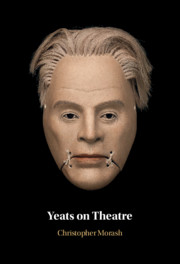Book contents
- Yeats on Theatre
- Yeats on Theatre
- Copyright page
- Contents
- Acknowledgements
- Abbreviations
- Introduction The Exact Moment
- Chapter 1 The Playwright as Thinker
- Chapter 2 The Fugitive Organum
- Chapter 3 Tragedy and Comedy
- Chapter 4 Form
- Chapter 5 Spaces and Objects
- Chapter 6 Bodies and Voices
- Chapter 7 Audiences
- Conclusion A Moment of Intense Life
- Notes
- Bibliography
- Index
Chapter 3 - Tragedy and Comedy
Published online by Cambridge University Press: 09 July 2021
- Yeats on Theatre
- Yeats on Theatre
- Copyright page
- Contents
- Acknowledgements
- Abbreviations
- Introduction The Exact Moment
- Chapter 1 The Playwright as Thinker
- Chapter 2 The Fugitive Organum
- Chapter 3 Tragedy and Comedy
- Chapter 4 Form
- Chapter 5 Spaces and Objects
- Chapter 6 Bodies and Voices
- Chapter 7 Audiences
- Conclusion A Moment of Intense Life
- Notes
- Bibliography
- Index
Summary
Throughout his life, W. B. Yeats used the terms ‘tragedy’ and ‘comedy’ in relation to the theatre.However, it is clear that his understanding of these terms did not derive from Aristotle.He also frequently mentions Nietzsche, and particularly Nietzsche’s Birth of Tragedy; however, he uses Nietzsche’s theory of tragedy in an unique and distinctive way.For Yeats, tragic theatre was what he referred to as 'subjective', a term he develops in his occult and philosophical works, particularly A Vision, and which he relates to vision, thought, and the individual.'Comedy', by contrast, is what Yeats considers to be 'objective', concerned with the material world and its manifestations, including the body, and rationality.Based on this opposition, Yeats lays the foundations for a theory of theatre that is distinctive, and which shapes his own theatrical practice.
Keywords
- Type
- Chapter
- Information
- Yeats on Theatre , pp. 65 - 92Publisher: Cambridge University PressPrint publication year: 2021

